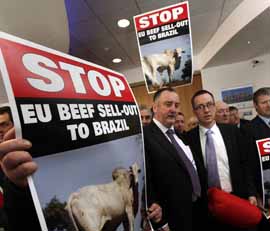Support for EU beef farmers, in the event of a Mercosur deal, is “not enough”

MercoPress | Wednesday, July 13th 2011
Support for EU beef farmers, in the event of a Mercosur deal, is “not enough”
Members of the European Parliament discussing the agriculture budget said that compensation for beef farmers that could face Mercosur competition, if a trade agreement is finally reached, “is not enough” and anticipated that “we will not accept sweeteners in this area”.
“We will not accept sweeteners”, said MEP James Nicholson “We will not accept sweeteners”, said MEP James Nicholson
“Can this budget live up to what is required? Can access to the new Globalization Fund which is supposed to be a compensation for beef farmers for the deal with Mercosur? It’s not enough” said MEP James Nicholson, belonging to the European Conservatives and Reformists (originally an Ulster Unionist) and who currently serves in the EP Agriculture Committee.
The EP has began to discuss the European agriculture budget with lawmakers demanding funding be kept at 2013 levels in real terms and on Monday received Agriculture Commissioner Dacian Ciolos who defended the European Commission’s proposed multi-annual EU budget for 2014/2020.
“It is a cut in real terms”, said Agriculture committee chair Paolo de Castro (S&D, IT), who questioned what the consequences of the proposal would be for the ambitious plans for the Common Agricultural Policy (CAP) after 2013.
Parliament adopted a resolution on 23 June calling for the long-term agriculture budget to be maintained at least at 2013 levels. “Parliament has sent a very clear signal that we do not want to see resources being taken away from the CAP”, which “needs to respond to the interests of 10 million farmers but also of all the citizens of Europe”, said Mr de Castro.
“The ball is now in the court of Council and Parliament”, said Commissioner Cioloş, who told MEPs that the proposed MFF was based on a freeze of CAP funding at 2013 levels.
The Commission, he stressed, had allocated “new money” to agriculture under different headings, for instance making €2.8 billion from the Globalization Adjustment Fund available to farmers. In addition, €5.1 billion of 100% EU-funded research and innovation programs was “clearly intended for the agriculture sector”. “This brings us to a total amount of €435.5 billion” for the farming industry, said the Commissioner.
“We simply cannot accept the CAP being the only sector that is supposed to take cuts.” Parliament had spoken out clearly that “we want to keep the CAP budget at its current size... especially given the future challenges” warned Albert Dess (EPP, DE)
“This is a long way from what we were expecting”, said Luis Manuel Capoulas Santos (S&D, PT). “The real cut is between 7% and 15% on the top of funds that have been shifted away from the agriculture budget”, he said.
Comparing figures from the previous long-term budget (2007-2014) with the new proposal, George Lyon (ALDE, UK) acknowledged that the additional €15 billion, especially money for research, was good news but could hardly be compared with cuts in direct payments worth approximately €40 billion.
However Martin Häusling (Greens/EFA, DE) welcomed the budget proposal. “If we are completely honest, about a year ago we were not really sure if we would be able to maintain the figures that we see today”, he said. Mr Häusling also welcomed the proposal to link 30% of the first pillar funds (direct payments) to the application of greening measures by farmers, a step criticized as premature by several MEPs including Albert Dess and James Nicholson.





